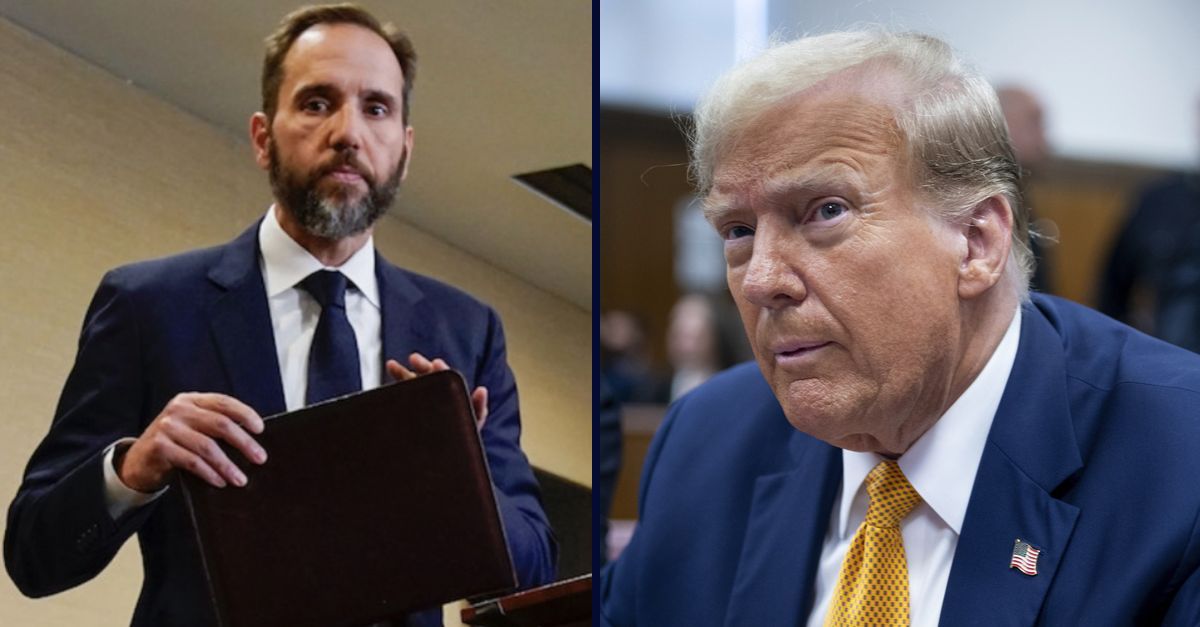
Left: Jack Smith: (AP Photo/Jacquelyn Martin). Right: Donald Trump (AP Photo/Craig Ruttle, Pool)
Special counsel Jack Smith and defense attorneys for former president Donald Trump admittedly “have differing views” about how and when to move the Jan. 6 election subversion case forward.
Earlier this month, Smith asked for and received permission to delay a filing concerning scheduling matters. Now, the government would like to pick up the pace and, in a late Friday filing advised an aggressive effort of combining various discussions in order to get the long-delayed case back on track and “promote judicial economy.”
The defense, meanwhile, wants to slow things down and suggested the Washington, D.C.-based district court push some pre-trial proceedings back to the spring and fall of 2025 “if necessary.”
The vastly different opinions on how to proceed came by way of a joint status report — a filing detailing discussions between the various parties in a legal controversy and signed off on by all sides’ lawyers.
The government offered a more amorphous “proposal,” while the defense offered a detailed, potential schedule.
In the status report, both the prosecution and the defense air their disagreements in regard to the novel and broad-reaching legal concept of post-presidential immunity for criminal acts created by the U.S. Supreme Court in their landmark opinion on July 1.
To hear the government tell it, U.S. District Judge Tanya Chutkan should jump headfirst into the issues implicated by the high court’s ruling and quick “schedule briefing” on the matter. An accelerated briefing schedule, Smith says, will allow the judge to “consider the parties’ positions on whether any categories of material in the superseding indictment or that the Government plans to use at trial” might run afoul of the restrictions put in place by the Supreme Court.
To accomplish this, the prosecution says, they should be allowed to file their own brief first — since they already filed a superseding indictment in an effort to dispense with several immunity issues.
From the government’s position section, at length:
To allow the Court to undertake the “factbound analysis” that the Supreme Court prescribed on remand, the Government proposes that it file an opening brief in which it will explain why the immunity set forth in [the immunity ruling] does not apply to the categories of allegations in the superseding indictment or additional unpled categories of evidence that the Government intends to introduce at trial and will proffer in its brief. The Government’s proposed brief would provide the defendant and the Court with detailed information regarding the “content, form, and context,” of the defendant’s conduct, distinguish his private electioneering activity from official action, and rebut the presumption of immunity as to any conduct that the Court may deem official.
Smith says Trump can respond after that — but only after that. And, the special counsel advised the court, they are ready to file their opening immunity brief when given the go-ahead. This position defers to the court on the precise timeline involved.
“Such a brief would position the defendant, in his response, to oppose the Government’s positions and raise any other immunity claims based on the superseding indictment and additional evidence set forth in the Government’s pleading,” the prosecution’s section goes on. “After the Government’s reply, the Court can assess the parties’ arguments on that record and conduct any further proceedings it deems necessary to resolve immunity issues.”
Not so fast, the defense counters.
In a sharp divide, Trump’s attorneys say the government has already had their second bite at the apple following the immunity ruling.
“The Special Counsel has drafted and filed its Superseding Indictment as it saw fit,” the defense section of the status report argues. “It is now President Trump’s right to challenge that indictment through appropriate motions and argument.”
Rather than going straight to immunity, Trump says the “threshold” matter after the Supreme Court ruling and superseding indictment is actually the scope of the discovery produced so far in the case.
“As an initial matter, the Supreme Court’s decision in Trump v. United States broke new ground on the scope of immunity, which the Special Counsel previously maintained did not exist. As a result, with respect to unclassified and classified discovery, there are serious threshold questions to be addressed,” the defense argues. “It cannot be assumed that any case file review by the Special Counsel at the outset of this case addressed disclosure obligations based on intervening precedent, and there are outstanding disputes between the parties about what that case-file review should entail.”
For that, Trump’s defense is more than happy to give Smith’s team the first deadline — a discovery production deadline of Sept. 30.
Next, the defense argues, is the matter of Smith’s appointment.
In other words, Trump’s second move is to try and convince Chutkan to follow the midsummer precedent set by Florida-based U.S. District Judge Aileen Cannon when she dismissed the Mar-a-Lago indictment based on the idea that Smith was improperly appointed (and similarly improperly funded) to his position as special counsel.
To that end, Trump offered a series of more firm deadlines — anticipating appointment and appropriations briefing and arguments should be done by the first week of December.
The government says this idea does not make sense.
At the same time as the court deals with immunity issues — and Smith suggests this almost literally — the court should “run [a] parallel” briefing schedule that will allow the parties to file and respond to any other motions filed in the case.
“The Government notes that it may promote judicial economy for the Court to schedule briefing of all other Rule 12 motions concurrent with the immunity litigation,” the prosecution’s position in the status report suggests. “That way, all motions will be fully briefed, and the Court can later determine when to take them under consideration.”
As for the big-ticket immunity determinations, Trump’s lawyers say they should get the first attempt at addressing the issue in a motion to dismiss due on Dec. 13. The defense’s proposed schedule also anticipates they would file several other motions and responses on this date.
Trump’s attorneys previewed the heart of their motion to dismiss — saying they intend to focus on the several references to the 45th president’s interactions with then-vice president Mike Pence.
The special counsel deleted all earlier references to the U.S. Department of Justice due to the Supreme Court’s insistence that a president’s DOJ-related interactions are entitled to “absolute” immunity. As for interactions with the vice president, however, the high court reasoned that a president is only entitled to “presumptive” immunity — a lesser form of immunity that can, in theory, be defeated.
“We believe, and expect to demonstrate, that this case must end as a matter of law. Should the courts determine otherwise, however, we have fashioned our proposed schedule to facilitate potential evidentiary submissions, should such submissions become necessary. ”
One small, and brief, area of agreement in the status report has to do with the Speedy Trial Act — a federal law that generally sets a 70-day window for a trial date to commence from when an indictment is filed.
“The parties believe the speedy trial deadline continues to be tolled because of at least one pending motion,” the status report reads. “For docket clarity, the parties ask the Court to issue an order excluding time from the date the mandate returned (August 2) through the deadline the Court sets for the filing of any motions.”
Have a tip we should know? [email protected]









